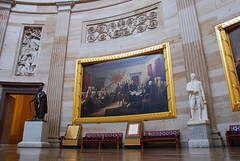The Declaration of Independence, being one of the most accurately named documents,
declared the intention of an unusual group of well-educated and privileged "few" to step forth--at risk of property, profession, reputation,
and charges of and hanging for treason-- on behalf of the "many" regardless of the
latter's wealth or lack of it, education, or opportunity at the present time. They did well, most of them, to seek to include those enslaved in the
colonies of the
land new to them; their document was a sword that later cut the bonds of
slavery.
Independence Day celebrations every July 4 mark a history and a reality, both deserving of special notice, both known and envied around the world. Criticism of this country often arises due to jealousy or resentment of what the U. S. has done, historically, to defend the weak and to defend itself and its
right to exist as the country it is, imperfect yet better than most, due to its basic principles of individual freedom, of liberty of thought, belief, and opinion. This is the freedom of
Judeo-Christian history, where no one is forced to espouse belief.
It is wonderful to be what one man, enslaved by Communism in the
USSR, once called, an American a person "who walks free." He noticed, on the streets of Moscow, an American walking. Without hearing
English spoken or seeing a passport or flag, the Soviet man he knew the man was not only a visitor, a foreigner, but also an American.
Excerpt:
IN CONGRESS, JULY 4, 1776
The unanimous Declaration of the thirteen united States of America

hen in the Course of human events it becomes necessary for one people to dissolve the political bands which have connected them with another and to assume among the powers of the earth, the separate and equal station to which the Laws of Nature and of Nature's God entitle them, a decent respect to the opinions of mankind requires that they should declare the causes which impel them to the separation.
We hold these truths to be self-evident, that all men are created equal, that they are endowed by their Creator with certain
unalienable Rights, that among these are
Life, Liberty and the pursuit of Happiness. — That to secure these rights, Governments are instituted among Men, deriving their just powers from the consent of the governed, — That whenever any Form of Government becomes destructive of these ends, it is the Right of the People to alter or to abolish it, and to institute new Government, laying its foundation on such principles and organizing its powers in such form, as to them shall seem most likely to effect their Safety and Happiness. Prudence, indeed, will dictate that Governments long established should not be changed for light and transient causes; and accordingly all experience hath shewn that mankind are more disposed to suffer, while evils are sufferable than to right themselves by abolishing the forms to which they are accustomed. But when a long train of abuses and usurpations, pursuing invariably the same Object evinces a design to reduce them under absolute Despotism, it is their right, it is their duty, to throw off such Government, and to provide new Guards for their future security....

 Image by Getty Images via @daylife
Image by Getty Images via @daylife












 hen in the Course of human events it becomes necessary for one people to dissolve the political bands which have connected them with another and to assume among the powers of the earth, the separate and equal station to which the Laws of Nature and of Nature's God entitle them, a decent respect to the opinions of mankind requires that they should declare the causes which impel them to the separation.
hen in the Course of human events it becomes necessary for one people to dissolve the political bands which have connected them with another and to assume among the powers of the earth, the separate and equal station to which the Laws of Nature and of Nature's God entitle them, a decent respect to the opinions of mankind requires that they should declare the causes which impel them to the separation.


